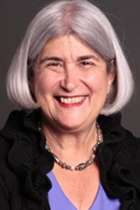Judith Hallett

Professor Emerita and Distinguished Scholar-Teacher, Classics
Affiliate, The Harriet Tubman Department of Women, Gender, and Sexuality Studies
Affiliate Professor Emerita, English
1210 Marie Mount Hall
Get Directions
Professor Judith P. Hallett (jeph@umd.edu) is Professor Emerita and Distinguished Scholar-Teacher in Classics at the University of Maryland. She specializes in Latin language and literature; women, sexuality and the family in ancient Greek and Roman society; and classical education and reception in the 19th and 20th century Anglophone world.
Author of Fathers and Daughters in Roman Society: Women and the Elite Family (Princeton 1984), Hallett has edited and contributed to several collections of essays. Among them are “Six North American Women Classicists” (special issue of the journal Classical World, 1996-1997) for which she wrote the featured article on Edith Hamilton; Compromising Traditions: The Personal Voice in Classical Scholarship, with Thomas Van Nortwick of Oberlin College (Routledge 1997); Roman Sexualities, with Marilyn Skinner of the University of Arizona (Princeton 1997); Rome and Her Monuments: Essays on the City and Literature of Rome in Honor of Katherine A. Geffcken, with Sheila K. Dickison of the University of Florida (Bolchazy-Carducci 2000); “Roman Mothers” (special issue of the journal Helios, 2006); British Classics Outside England: The Academy and Beyond, with Christopher Stray of the University of Swansea (Baylor, 2008); A Roman Women Latin Reader, with Sheila K. Dickinson (Bolchazy-Carducci 2015), and Ancient Women Writers of Greece and Rome, with Bartolo Natoli of Randolph-Macon College, and Angela Pitts of the University of Mary Washington (Routledge, 2022). She is also the author of the four essays on classical Roman women authors in Women Writing Latin (Routledge 2002) as well as numerous chapters in books, articles, reviews and translations into both English and classical Latin. A longtime editor of the journal Classical World, since 2011 she has served as the North American editorship of EuGeStA, a European-based online journal of gender studies in the fields of classics and classical reception, that she founded together with Jacqueline Fabre-Serris of the University of Lille.
Hallett received her BA from Wellesley College and her MA and PhD in Classical Philology from Harvard University. While attending Harvard, she studied at the American Academy in Rome; after receiving her doctorate, she spent a year at the Institute of Classical Studies at the University of London. She was Blegen Visiting Scholar in Classics at Vassar College, and has held Mellon teaching fellowships at both Brandeis University and the Wellesley Center for Research on Women, as well as research fellowships and grants from the National Endowment for the Humanities, the German-American Academic Council, the Classical Association of the Atlantic States, the National Science Foundation/ADVANCE, and the University of Maryland Graduate School. Winner of the College of Arts and Humanities Award for Excellence in Teaching, and honored by the Center for Excellence in Teaching Celebrating Teachers Program in 1994 and 2002, she was named a Distinguished Scholar-Teacher in 1992-1993 and a Lilly Center for Excellence in Teaching fellow in 2002-2003.
Hallett was president of the Classical Association of the Atlantic States in 2000, and coordinated the program for the CAAS meetings from 2000-2009, including the program for its centennial meeting in October 2007. Elected to the American Philological Association Board of Directors, on which she served from 1997-1999, she was appointed the Vice-President of its Division of Outreach for 1999; she was subsequently elected APA Vice-President for Outreach, and served in this position from 2008-2011. From 2001-2011 she was a member of the Maryland Humanities Council, and from 2002-2009 on the Board of Trustees, Baltimore Hebrew University; in 2010 she was appointed to the Board of Directors of the Thornton Wilder Society.
From 1986 through 1994 Hallett was featured on “The Court of Ideas,” a long-running Canadian Broadcasting Company educational radio program, as an expert witness on the death of Cleopatra, the criminal conduct of the emperor Nero, the treasonable behavior of the British queen Boadicea, and the claims to equal rights of the Greek poet Sappho. She has been interviewed by Sander Vanocur from the History Channel/A&E series “Movies in Time”: first on the rebroadcast of the British Broadcasting Company’s serialization of I, Claudius, and later on the airing of the 1963 film The Fall of the Roman Empire. Other History Channel A&E episodes include the segment on Antony and Cleopatra for their 1998 Valentine Day’s special on the five greatest love affairs in history, and their 1999 series on The History of Sex. A consultant on the 2001 PBS documentary series The Roman Empire in the First Century, funded in part by the National Endowment for the Humanities, she appeared in all four of its episodes. In 2001, she co-organized the Historical Clinical Pathological Conference on the death of the emperor Claudius, and a coordinated conference on neuropsychiatric illness in the Julio-Claudian dynasty, at the University of Maryland Medical School.
In May 2013, Routledge Monographs in Classical Studies published Roman Literature, Gender and Reception: Domina Illustris, comprising nineteen essays collectively honoring Judith P. Hallett's work. Edited by Donald G Lateiner, Barbara K. Gold and Judith Perkins, the volume begins with an intellectual biography of Hallett entitled "Judith Peller Hallett: An Introduction to a Force of Nature" and concludes with her bibliography from 1970-2012. She has been elected president for 2013-15 of the Gamma of Maryland Chapter of Phi Beta Kappa, which celebrates its fiftieth anniversary in 2014.
Awards & Grants
WCC Leadership Award to Professor Hallett
Professor and Distinguished Scholar-Teacher Emerita Judith Hallett to receive the 2019 Leadership Award of the Women's Classical Caucus
Author/Lead: Judith HallettCongratulations to Professor and Distinguished Scholar-Teacher Emerita Judith Hallett, who has received the 2019 Leadership Award of the Women's Classical Caucus. This award is "given to an individual for outstanding contribution in encouraging women to enter and remain" in the field of Classics. The award was announced at the annual meeting of the Society for Classical Studies in Washington, D.C. on January 2nd, 2020.

